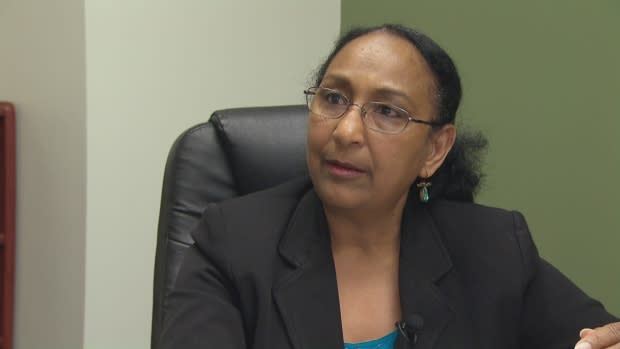Discrimination in Nova Scotia drove woman to become human rights advocate
The Halifax Central Library is a long way from the Kannour village in Sudan, and Huwaida Medani is a far cry from who she was when she left her home at the age of 18.
Since she arrived in Halifax 13 years ago she has transformed herself into an ardent fighter for human rights. On Monday she was recognized for that work when she was presented with a Nova Scotia Human Rights Award.
Medani, who now works for the Halifax Regional Municipality as advisor of diversity and inclusion, was one of four individuals and two groups to receive awards from the Nova Scotia Human Rights Commission.
She said she was honoured, but has felt she had no choice but to fight for human rights.
"As a racialized black immigrant woman with an accent I had to stand up for myself most of my life in Nova Scotia," said Medani.
"People assumed that they know me and they know my talents and they know my competence, which is you are not talented, you're not competent, you cannot do this. Most of the time based on the colour of my skin and based on the fact that I do have an accent. So I find myself trying to prove a point, trying to work harder, to show why I am competent like anybody else."
Once she started fighting back against the racism and discrimination she faced, Medani started fighting for the rights of others. She joined a volunteer group designed to help people immigrating from Africa better adapt to life in Canada. From there she fought for more opportunities for racialized and marginalized women to get into leadership roles.

It was an uphill battle.
She said the community likes to put people into boxes.
"You are a black person this is your place, you're an Indigenous person this is your place, you're a person with a disability this is the way we'll treat you," she said. "This is actually a limitation in the community now, like we all need to work together to advance human rights."
She hopes her work has helped advance human rights and helped reduce discrimination. But she said she didn't do it alone, and all the volunteers she worked with over the years could just as easily have been given the human rights award.
"I didn't think I did enough to deserve it, to tell you the truth. Seriously, I struggled a little bit because this is not my work on my own; as I mentioned there is the support of these women."
Other award recipients
Individual awards were also given to Kardeisha Provo of North Preston, DeRico Symonds of Halifax and Eric Smith of Halifax. Group awards went to the Inverness Development Association and the South End Environmental Injustice Society in Shelburne.
Provo won the Youth Award for her work challenging negative stereotypes about her community through her YouTube channel and public presentations.
Symonds received the Dr. Burnley "Rocky" Jones award for his work addressing the many barriers facing African-Nova Scotian and other marginalized youth by providing employment opportunities and education programs.
Smith was recognized for his advocacy work related to HIV/AIDS and in protecting the LGBT community from on-the-job discrimination.
The Inverness Development Association was recognized for its renovation of the Inverness Beach boardwalk, making it accessible to beachgoers who are disabled.
The South End Environmental Injustice Society received an award for its advocacy against environmental racism.
"What is your role do you have in terms of human rights?" said Medani, "You can either be oppressor, oppressed, or ally. Nobody's neutral. Just find your role."

